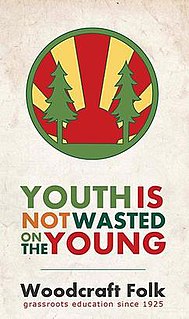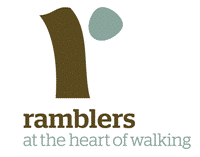
Woodcraft Folk is a UK-based educational movement for children and young people. Founded in 1925 and grown by volunteers, it has been a registered charity since 1965 and a registered company limited by guarantee since 2012. The constitutional object of this youth organisation is "to educate and empower young people to be able to participate actively in society, improving their lives and others' through active citizenship."

Which? is a United Kingdom brand name that promotes informed consumer choice in the purchase of goods and services by testing products, highlighting inferior products or services, raising awareness of consumer rights and offering independent advice. The brand name is used by the Consumers' Association, a registered charity and company limited by guarantee that owns several businesses, including Which? Financial Services Limited, Which? Legal Limited and Which? Limited, which publishes the Which? Papers.

Humanists UK, known from 1967 until May 2017 as the British Humanist Association (BHA), is a charitable organisation which promotes secular humanism and aims to represent "people who seek to live good lives without religious or superstitious beliefs" in the United Kingdom by campaigning on issues relating to humanism, secularism, and human rights. It seeks to act as a representative body for non-religious people in the UK.
The Council for British Archaeology (CBA) is an educational charity established in 1944 in the UK. It works to involve people in archaeology and to promote the appreciation and care of the historic environment for the benefit of present and future generations. It achieves this by promoting research, conservation and education, and by widening access to archaeology through effective communication and participation.
The Chartered Institute of Library and Information Professionals, since 2017 branded CILIP: The library and information association, is a professional body for librarians, information specialists and knowledge managers in the United Kingdom. It was established in 2002 as a merger of the Library Association and the Institute of Information Scientists (IIS).

Citizens Advice is an independent organisation specialising in confidential information and advice to assist people with legal, debt, consumer, housing and other problems in the United Kingdom.

The Geographical Association (GA) is an association in the United Kingdom. The organisation aims to improve geographical knowledge of the public through promoting geographical education. It is a registered charity and is independent of state aid.
The Association for Industrial Archaeology (AIA) was established in Great Britain in 1973 to promote the study of industrial archaeology and to encourage improved standards of recording, research, conservation and publication. It aims to support individuals and groups involved in those objectives and to represent the interests of industrial archaeology at a national level. It is a registered charity and a company limited by guarantee.

The Royal Australasian Ornithologists Union (RAOU), now part of BirdLife Australia, was Australia's largest non-government, non-profit, bird conservation organisation. It was founded in 1901 to promote the study and conservation of the native bird species of Australia and adjacent regions, making it Australia's oldest national birding association. In 1996, the organisation adopted the trading name of Birds Australia for most public purposes, while retaining its original name for legal purposes and as the publisher of its journal, the Emu. In 2012, the RAOU merged with Bird Observation & Conservation Australia to form BirdLife Australia.
The Historical Association is a membership organisation of historians and scholars founded in 1906 and based in London. Its goals are to support "the study and enjoyment of history at all levels by creating an environment that promotes lifelong learning and provides for the evolving needs of people who share an interest in history." The association's patron is Queen Elizabeth II. The Historical Association was incorporated by royal charter in 2006, its centenary year. Legally it is a charity registered in England. The plan for a national historical association came from a group school teachers. The formation was handled by university academics, especially Charles Firth, Albert Pollard, and Thomas Tout. At first it dealt chiefly with teaching problems. The membership was expanded to include laymen, and the association branched out into activities such as publication and research in local history.

Mind is a mental health charity in England and Wales. Founded in 1946 as the National Association for Mental Health (NAMH), it celebrated its 70th anniversary in 2016.
The New Zealand Association of Radio Transmitters (NZART) is a non-profit organisation of amateur radio enthusiasts in New Zealand. It represents New Zealand amateur radio operators nationally and internationally. NZART is a founding member of the International Amateur Radio Union. It is an association of individual members, however those members are encouraged to form local branches.

The Nautical Archaeology Society (NAS) is a charity registered in England and Wales and in Scotland and is a company limited by guarantee.

The University of St Andrews Students' Association is the organisation which represents the student body of the University of St Andrews. It was founded in 1885 and comprises the students' representative council and the Student Activities Forum.

The English Bridge Union or EBU is a player-funded organisation that promotes and organises the card game of duplicate bridge in England. It is based at offices in Aylesbury. The EBU is a member of the European Bridge League and thus affiliated with the World Bridge Federation, which promulgates the laws of the game.
The Chartered Institute of Logistics and Transport in the UK is the membership organisation for United Kingdom professionals involved in the movement of goods and people, and their associated supply chains. It is a National Council of CILT International.
The International Institute for Conservation of Historic and Artistic Works (IIC) is a global organisation for conservation and restoration professionals with over two thousand members in over fifty countries. IIC seeks to promote the knowledge, methods and working standards needed to protect and preserve historic and artistic works throughout the world.
In universities in the United Kingdom students' unions are constituted under Section 2 of the Education Act 1994. The ultimate purpose of students' unions is to democratically represent the interests of their members. Students who resign their membership may still use union social facilities provided since they are for the benefit of the students of the institution, not just union members. The vast majority of UK students' unions are affiliated with the National Union of Students (NUS).

The Ramblers is the trading name of the Ramblers Association, Great Britain's leading walking charity. The Ramblers is also a membership organisation with around 100,000 members and a network of volunteers who maintain and protect the path network. The organisation was founded in 1935, and campaigns to keep the countryside open to all.
The National Association of Flower Arrangement Societies (NAFAS) is a society of flower arranging clubs and societies in the United Kingdom.











